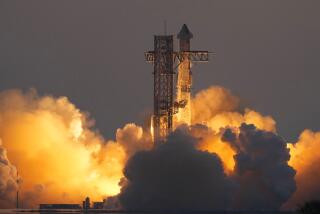Delta IV’s First Launch Provides a Lift to Boeing
- Share via
After more than $1.5 billion in development costs, a year of delays and with much of its reputation on the line, Boeing Co. on Wednesday successfully launched its new Delta IV rocket, putting the company back in the race against its archrival Lockheed Martin Corp. for supremacy in space.
Powered by the nation’s first new rocket engine in nearly three decades, the Delta IV took off from Cape Canaveral, Fla., at 2:39 p.m. PST. It placed a European communications satellite in orbit 37 minutes later, lifting the prospects for Boeing’s hobbled launch business.
Hundreds of Boeing workers in Huntington Beach who were watching the launch outdoors on a jumbo TV screen erupted in loud cheers as the mission controller announced, “We have liftoff!”
More than 5,000 Boeing engineers and designers work on the rocket program in Huntington Beach and Canoga Park.
“It was a beautiful launch,” said Will Trafton, president of Boeing’s Launch Services unit. “This is a new day. We proved a lot to the industry.”
The Delta IV’s success means Boeing can better compete with Lockheed to win more launch contracts from the Air Force, which is the primary customer for the foreseeable future given the meltdown of the U.S. telecommunications business and the resulting slump in the commercial satellite industry.
In August, Lockheed successfully launched its new rocket, the Atlas V, and a Delta IV failure would have put in jeopardy Boeing’s prospects for launches worth as much as $40 billion over the next 20 years.
“It was extremely important for Boeing to get it right,” said Marshall H. Kaplan, a former rocket engineer and now director of space programs for Strategic Insight Ltd., a Crystal City, Va., consulting and research firm. “They’ve had a lot of problems, so they needed to have a successful launch if they wanted to keep up” with Lockheed.
Boeing had so much riding on Wednesday’s launch in part because its previous model, the Delta III, had a terrible flight record.
The first two Delta III launches were failures: The first rocket exploded in flight, and a crack in the second rocket’s engine resulted in a satellite being put into the wrong orbit, costing Boeing nearly $500 million. To prove it could get the Delta III off the ground, Boeing had to pay for the third launch, which was successful.
To help spur development of a new generation of lower-cost rockets, the Pentagon gave Boeing and Lockheed $500 million to help cover the cost of design work.
The rival rockets, officially dubbed Evolved Expendable Launch Vehicles, were developed to launch satellites and other payloads and represent the most significant overhaul of the U.S. launch system since the 1950s.
The Air Force, which wants to use the rockets to launch satellites for spying, weather forecasting, communications, navigation and other experiments, has relied on Lockheed’s Titan IV to launch its larger, sophisticated satellites. Each Titan mission, however, costs about $400 million, significantly more than the $100 million to $150 million per launch for the new rockets.
Most rocket engines have been derivatives of technologies developed in the ‘50s when aerospace companies began designing ballistic missiles to deliver nuclear warheads. Analysts said Boeing took a greater risk on the Delta IV, electing to create an entirely new rocket engine, the first in three decades.
In all, Boeing spent more than $1.5 billion, including $500 million developing the Delta IV’s RS-68 engine in Canoga Park, as well as constructing new launch pads at Cape Canaveral and Vandenberg Air Force Base in Santa Barbara County. The Delta IV uses liquid hydrogen fuel; the Atlas V relies on a Russian engine design that burns kerosene.
Wednesday’s launch was a welcome relief to both Boeing and the Air Force, which was so concerned that the Delta IV program was falling behind schedule that it considered shifting more work to Lockheed.
Boeing delayed the Delta IV launch numerous times in the last year because of both software glitches and hardware problems.
Boeing was scheduled to launch the Delta IV on Saturday, but blast-off was delayed to Tuesday, only to have minor mechanical problems and high winds prompt launch managers to once again scrub the mission.
Boeing closed up 33 cents to $31.73 the New York Stock Exchange. The launch came after the market closed.
More to Read
Inside the business of entertainment
The Wide Shot brings you news, analysis and insights on everything from streaming wars to production — and what it all means for the future.
You may occasionally receive promotional content from the Los Angeles Times.










